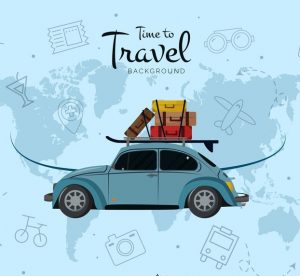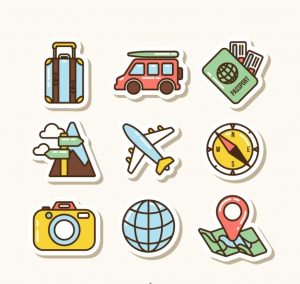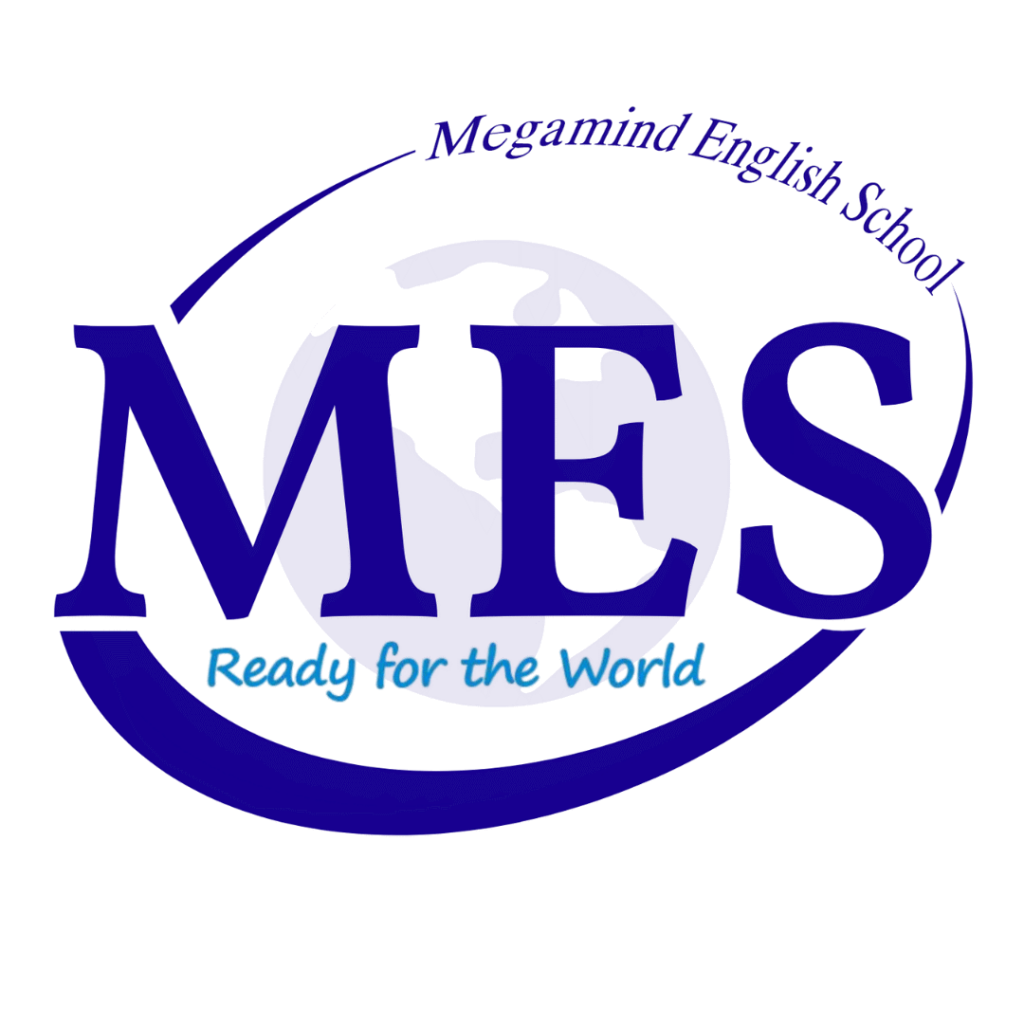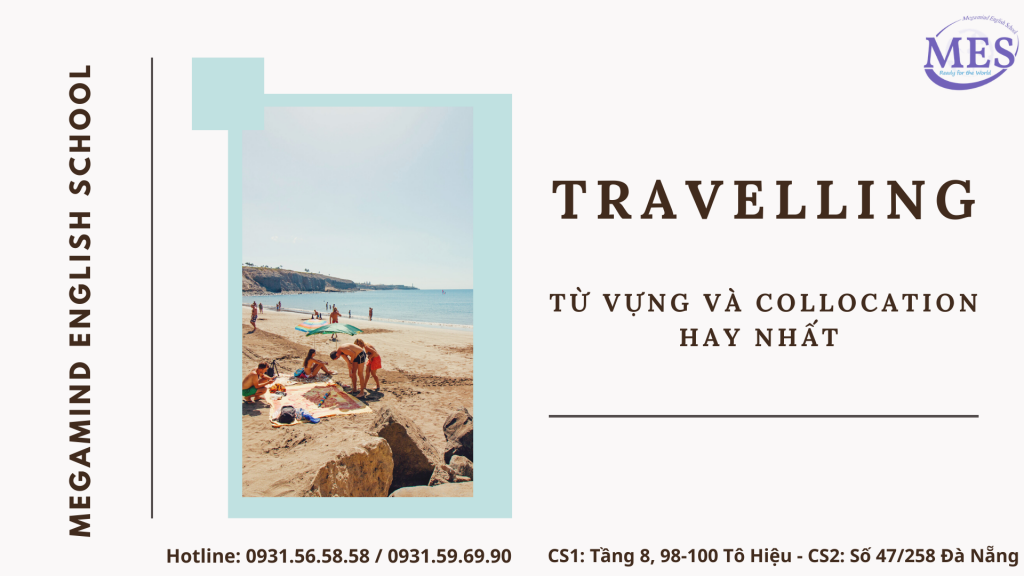Travelling là một chủ đề vô cùng quen thuộc trong IELTS. Bài viết sau đây sẽ mang đến một số từ vựng và collocation thông dụng giúp người học bổ sung vốn từ vựng của mình. Chúc các bạn ôn thi tốt nhé !
I, Các từ vựng
1. Các loại hình du lịch và các kỳ nghỉ
Inbound travel/ Inbound tourism: Du lịch trong nước
Outbound travel/ Outbound tourism: Du lịch nước ngoài
Backpacking: Du lịch bụi, phượt
Hiking/ ecotourism: Du lịch sinh thái
Leisure travel: Du lịch nghỉ dưỡng
Adventure travel: Du lịch khám phá mạo hiểm
Trekking: Du lịch với hành trình dài đến những nơi hoang dã
Short break: kỳ nghỉ ngắn ngày
Sightseeing: Đi tham quan chủ yếu nhằm mục đích đi và ngắm cảnh
Package tour = Package holiday: Kỳ nghỉ trọn gói
Holiday of a lifetime: Kỳ nghỉ mang ý nghĩa đặc biệt trong đời
Self-catering: Kỳ nghỉ mà bạn cần phải tự phục vụ đồ ăn
Tourist trap: – Nơi nhiều khách du lịch đến và khách du lịch thường bị bóc lột bằng cách lấy tiền đắt
Wildlife safari: – danh từ không đếm được – Chuyến đi thám hiểm động vật hoang dã
2. Các danh từ chỉ người
Bên cạnh các từ vựng IELTS chủ đề du lịch chỉ các địa điểm du lịch nêu trên, các bạn hãy tham khảo các từ vựng liên quan đến những người liên quan đến ngành du lịch:
Outbound tourists/ Outbound travelers: khách du lịch trong nước
Inbound tourists/ Inbound travelers: Khách du lịch nước ngoài
Visitors: người thăm quan
The locals/ local people/ residents: Người dân địa phương
Native people/ Indigenous people: Người bản địa
Travel agency: Đại lý du lịch
Travel service providers: Người cung cấp các dịch vụ du lịch
Tour Guide: Hướng dẫn viên du lịch
-
Các từ vựng liên quan đến chủ đề du lịch:
Guided tour: -Chuyến đi có hướng dẫn viên du lịch
Youth hostel: phòng giá rẻ
Holiday brochure: a glossy publication with details of holiday packages – Cuốn sách nhỏ về, những kỳ nghỉ
3. Các hoạt động:
Go sightseeing: Ngắm cảnh
Exploit and enjoy pristine beauty: Khám phá và cảm nhận vẻ đẹp hoang sơ
Go in the low season: Đi du lịch vào mùa thấp điểm
Go in the peak season: Đi du lịch vào mùa cao điểm
Partake in outdoor games/ Play outdoor games: Tham gia những hoạt động ngoài trời
Do extreme sports: Chơi các môn thể thao mạo hiểm
Buy souvenirs: Mua quà lưu niệm
Enjoy local speciality: Thưởng thức văn hóa địa phương
Take pictures: Chụp ảnh
To get away from it all: To take a holiday to escape a busy or stressful lifestyle – Thoát khỏi tất cả đi du lịch để giảm căng thẳng
To put one’s feet up/ to let my hair down: To sit down and relax, especially with your feet raised and supported – Thư giãn
To do some sunbathing: Tắm nắng
To try/ sample the local food: Thử các món đặc sản
To go out at night: đi chơi buổi tối
To dive: Lặn
To go sailing: Chèo thuyền
To windsurf: Lướt ván
To laze around on the sandy beach: Nghỉ ngơi, thư giãn bên bãi biển
To enjoy bustling trade: Tận hưởng sự mua sắm nhộn nhịp
To take a sunset cruise: Đi ngắm mặt trời lặn
To dispel the heat of summer: Xua tan cái nắng của mùa hè
To promote tourism image: Quảng bá hình ảnh du lịch
4. Một số cách miêu tả địa điểm du lịch
Ngoài các từ vựng IELTS về du lịch, dưới đây cũng sẽ là một gợi ý cho bạn khi miêu tả về địa điểm du lịch đó:
It’s a disappearing natural wonder: Đó là một kỳ quan đang mất dần đi.
The place itself is majestic: Majestic = hùng vĩ, đồ sộ).
Scenery: phong cảnh
It’s an amazing wonder to see in person: Đây là một kỳ quan tuyệt vời khi nhìn tận mắt
It’s absolutely a must-go place for everyone: Đó là một nơi phải đến cho tất cả mọi người
It’s truly one of the most amazing places I have ever seen: Đó thực sự là một trong những nơi tuyệt vời nhất tôi từng thấy
Breathtaking: ngoạn mục
It’s a beautiful scenic spot: Đó là một cảnh đẹp rực rỡ
MỘT SỐ TÍNH TỪ KHÁC:
– Serene: thanh bình
– Stunning: đẹp đến kinh ngạc
– Mesmerizing: đẹp quyến rũ, bị mê hoặc
– Spectacular: đẹp ngoạn mục
5. Các từ vựng về lợi ích của du lịch
See another culture first-hand: Cảm nhận trực tiếp một nền văn hóa khác
Promote/ spread local culture to international friends/ International travellers: quảng bá văn hóa đại phương đến khách du lịch quốc tế
Create/ generate employment opportunities: Tạo công ăn việc làm, tạo cơ hội việc làm
Develop economy/ boost economy: Phát triển nền kinh tế
Increase foreign currency by means of travel-related services: Tăng ngoại tệ nhờ vào những dịch vụ du lịch
Making the host destination more authentic and desirable to visitors: Lôi cuốn khách đến thăm quan nhiều hơn
Bring about a real sense of pride and identity to communities: Dấy lên niềm tự hào dân tộc và bản sắc văn hóa trong cộng đồng
Restore historical sites/ historical buildings/ historical monuments: Bảo tồn lưu giữ các công trình lịch sử
Widen horizon/ outlook a new culture: Mở mang tầm nhìn về một nền văn hóa mới
6. Mặt trái của du lịch
Pollute/ contaminate environment: Làm ô nhiễm môi trường
Damage environment: Phá hủy môi trường
Ruin/ damage/ undermine local culture: Làm ảnh hưởng văn hóa địa phương
Weaken the identity of local culture: Làm phai mờ bản sắc văn hóa địa phương
Illegally exploit its ecological traits for individual benefits: Khai thác hệ sinh thái một cách hợp pháp nhằm phục vụ các lợi ích cá nhân
Cause heavy traffic jam in main routes: Gây tắc nghẽn giao thông

II, Một số Collocation thông dụng khác.
1.To be in the middle of nowhere: Ở một nơi xa xôi hẻo lánh
Amazon river is not a kind of being in the middle of nowhere, it’s famous for its wild scene, a wide variety of animal and attract a lot of explorer every year.
2. Off the beaten track: Vùng xa, bí hiểm, chưa ai biết đến
Exploring the wood to some people is going to a place which is off the beaten track, but to me, as a fan of exploring, I get used to it and like it.
3. Peak season/ Low season: mùa cao điểm/ mùa thấp điểm
On peak season, costs of hotel and other services in scheduled place are getting higher. Sometimes, if you don’t book in advance, you may not have any room to stay.
4. Scheduled beach: bãi biển vắng người
But frankly speaking, I would rather enjoy the scheduled beach’s view than anything else.
5. Tourist trap: Nơi thu hút đông khách du lịch
I have a feeling that being in a Tourist trap, I am inconvenient because of the noise and the crowd there.
6. Have a thirst for adventure: niềm đam mê du lịch, khám phá
Having a thirst for adventure, I would like to explore new place, which hasn’t been known before.
7. Dominate the landscape: nơi cao nhất
Khalifa tower of Dubai dominates the landscape in the world.
8. To be an eye-opener: trải nghiệm giúp mở mang tầm mắt
That journey to the most far off the beaten track is an eye-opener to me, I have learnt a lot from this experience.
9. Discover new culture and cuisine: Khám phá nền văn hoá, ẩm thực
Thailand is reputed for its unique in culture and custom. Once you have time to visit here, you should discover new culture and cuisine, try everything and make it as your own memory.
10. Escape the daily routine: thoát khỏi cuộc sống thường nhật
When you have free time, you should escape the daily routine, stand up and go for a travelling, adapt yourself to the adventure and relax.
11. Capture the beauty of: lưu giữ lại vẻ đẹp của
My Nikon is the best mate of me. He always accompanies and captures the beauty of scenery or breathtaking view in my trip.
12. Get away from the hustle and bustle of the city: tránh khỏi ồn ào náo nhiệt ở thành phố
Make best use of your time to free yourself from loads of works, get away from the hustle and bustle of the city by going on a vacation with bestie or homie.
13. Go backpacking: du lịch bụi
When I was a student at university, I and my homies often go backpacking once every 2 month to a trekking place for new experience
14. Package deal = package tour = package holiday: du lịch trọn gói
Family often chooses package tour as for its convenient for all of the advanced booking and available services.
15. Red-eye flight: chuyến bay muộn ban đêm
Having not booked in advanced, all of the seats were full, therefore, I have to choose the red-eye flight back to my hometown.
16. Call it a day: kết thúc những hoạt động của một ngày, trở về phòng, khách sạn
After a full day with meaningful activities for teambuilding, everyone may get tired. We should call it a day, shower and relax, then gather in the front door for night camping!
17. Bright and early/ first thing: sáng sớm tinh mơ.
We’ll need to leave bright and early to catch the first ferry to the island
18.Set off on one’s travels: Bắt đầu chuyến du lịch
We should go to sleep early tonight because we must set off on our travels earlier than planned.
19 Pack one’s bags: Thu xếp hành lý chuẩn bị đi chơi
Everyone should be ready, buy everything you need, bring them along and pack all things in your bags before a long day vacation.
20. Fleabag motel/roach motel: một phòng trọ giá rẻ, tồi tàn.
Being cheated by the appearance of this motel, we have booked full week staying here. When moving to the room, it’s really a fleabag motel.

III. Các lưu ý
Dưới đây sẽ là một số các câu hỏi mà bạn có thể gặp trong phần thi IELTS Speaking và Writing như:
Speaking Test:
Part 1:
-
Do you like travelling?
-
Whom do you often spend the holiday with?
-
How much of travel have you done?
-
What kind of places have you visited in your life?
-
When you visit new places, what do you like to do?
-
Do you prefer travelling alone or in a group?
-
In which seasons do you prefer to travel?
-
What is the best season to travel in your country?
-
Would you say your country is a good place for travellers to visit?
-
What places in your country, would you recommend to a foreigner?
-
What places would you like to visit in the future?
-
How much time do you spend travelling on a normal day?
-
What do you do while you are travelling?
-
Do you think your hometown is a good place for a holiday?
Part 2:
Describe a tourist attraction you once visited.
You should say :
-
When you visited it
-
Where is it situated
-
Whom you went with
-
and say what about it you like the most
Describe a beautiful place you once visited.
You should say :
-
when you went to this place
-
where it was
-
whom you went with
-
and say why you liked it so much.
Describe a short trip that you usually make (or, take) but dislike.
You should say :
-
where you travel from and to
-
how often you make this trip
-
why you make this trip
-
and explain why you dislike this trip.
Describe a trip that took longer than you expected.
You should say :
-
when it happened
-
where you were travelling to
-
whom you were travelling with
-
and explain why it took longer than you expected.
Describe a trip that didn’t go as you had planned/expected.
You should say :
-
where were you travelling to
-
who was travelling with you
-
what didn’t happen according to plan
-
what did you do there
-
and explain how you felt.
Part 3:
Travelling
-
Do people in your country like to travel?
-
How has travelling changed, compared to several decades ago?
-
When do people travel (as tourists), whom do they usually go with?
-
Do you think travel can (or, does) change people’s ways of thinking?
-
What are the disadvantages of not travelling?
Travelling in cities
-
How do most people in your country travel to work?
-
People in cities used to like living downtown but now they prefer to live in the suburbs. Can you explain why?
-
What is the impact of vehicles on people’s lives?
-
Do people in your country prefer to walk or take a car for short trips?
-
How can big cities deal with the problem of having many people crowded in the same place?
-
Are there any connections between transportation and the environment?
-
Does your hometown have problems connected to transportation? How could these problems be solved?
-
Is cycling very popular in your city?
-
What are the differences between travelling by car and travelling by bicycle in a city?
-
What are the advantages and disadvantages of cycling in the city?
-
How could the government encourage more people to use bicycles in the city?
-
What are the benefits of having a good public transportation system in a city?
-
How will transportation in cities change in the future?
Writing Test:
1.Organized tour to remote areas and community is increasingly popular. Is it a positive or negative development for the local people and the environment?
2.Tourism is an ever growing industry. What benefits do you think tourism brings to individuals and society?
3. As a result of tourism and the increasing number of people travelling. There is an growing demand for more flights.
– What problems does this have on the environment?
– What measures could be taken to solve the problems?
* Bạn không cần cố gắng sử dụng tất cả các từ vựng phía trên, hãy sử dụng hợp lý trong các đề thi IELTS của mình. Hãy chọn lọc các từ vựng IELTS về du lịch phía trên để có thể vượt qua các kỳ thi của mình.
MES- MEGAMIND ENGLISH SCHOOL





Bài viết liên quan
TRỌN BỘ ĐỀ DỰ ĐOÁN IELTS SPEAKING QUÝ 1/2026
📘🔥 TRỌN BỘ ĐỀ DỰ ĐOÁN IELTS SPEAKING QUÝ 1/2026 🔥📘 Sẵn sàng cho kỳ [...]
34 ĐỀ THI CHUYÊN ANH CÁC TỈNH – NĂM 2025 (FULL & CHUẨN)
📘🔥 34 ĐỀ THI CHUYÊN ANH CÁC TỈNH – NĂM 2025 (FULL & CHUẨN) 🔥📘 [...]
Listening “Education – on campus”
“Nghe chủ động – hiểu nhanh – tiến bộ thật!”File nghe tuần này: chủ đề [...]
Listening topic “Work”
“Nghe chủ động – hiểu nhanh – tiến bộ thật!”File nghe tuần này: chủ đề [...]
Listening topic “EDUCATION”
“Nghe chủ động – hiểu nhanh – tiến bộ thật!”File nghe tuần này: chủ đề [...]
🎧 Listening Practice – Chủ đề: “TRAVEL”
“Tai phải nghe – não phải nghĩ – Anh ngữ phải lên!” File nghe tuần [...]